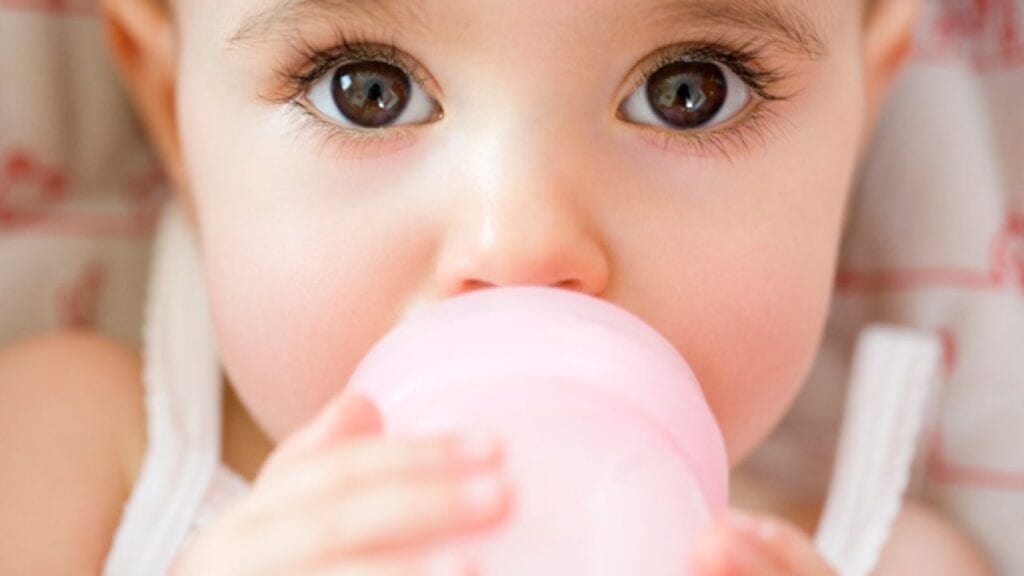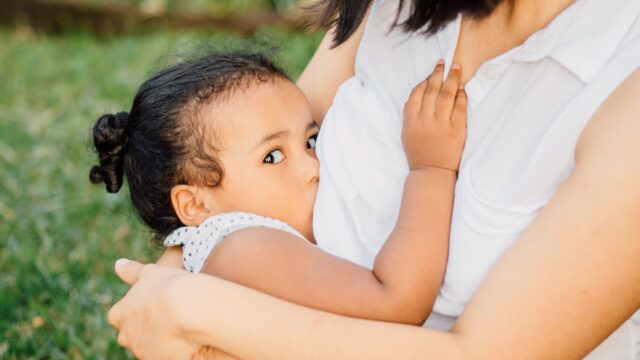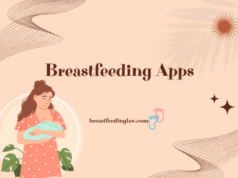Prolonged breastfeeding or breastfeeding after a baby’s first birthday always causes different reactions. Some people are shocked and even appalled by the fact that you have decided to breastfeed a walking baby.
But in much of the world, breastfeeding an older child is common, and most people don’t discuss something so natural at all.
The World Health Organization recommends breastfeeding until the second year of a child’s life and beyond if the mother and child want it. As long as the mother and the little one are happy and want to continue breastfeeding, there is no upper limit for stopping breastfeeding.
Speaking of needs, let’s list just a few facts about how nutritiously milk meets a baby’s needs in the second year.

These figures show that as far as the nutritional values of milk are concerned, the child still received a lot of vitamins, minerals, and proteins. Some of the reasons for prolonged breastfeeding:
- because I reduce her risk of getting uterine and ovarian cancer one day
- because I reduce her risk of developing diabetes and obesity
- because I reduce her risk of allergies
- because I reduce her risk of cardiovascular disease
- because I reduce her risk of getting ear infections, bronchitis, and asthma.
Despite the references of the World Health Organization, there are very few mothers who breastfeed a child two years of age or older. The big problem is that very few babies are breastfed even after only a few months of birth.
The decision on how much a mother will breastfeed most often depends on the mother and baby’s environment. In environments where breastfeeding rates are meager, mothers will feel the pressure to stop breastfeeding after a few months, while in other places, they will feel the pressure a little later.

Although some people imagine it quite differently, prolonged breastfeeding for a breastfed baby means two to three breastfeeds a day. If he gets injured, breastfeeding is a consolation most often in the morning and before bed.
Because prolonged breastfeeding is rare, it is sporadic to see a woman breastfeeding an older child in public.
If they do breastfeed, they choose to do so within their four walls to avoid criticism.
When something is not seen often, it becomes unknown, and unknown things mostly seem strange to us, at least at first.
We all raise children in our unique way.
When we talk about raising children, no parent raises a child the same way. We are all individuals and have a unique way of raising children.

Some children are fed formula from day one. Other children are fed in combination with formula and breastfeeding; some receive exclusively expressed breast milk from a bottle; others are breastfed from birth.
Some parents sleep with their children in the same room, some share a bed with their children, and others sleep in separate rooms. Sometimes, children have pacifiers, and some other children never have them.
If you neglect your thoughts about what parenting should be like and try to see things from various perspectives, you will begin to appreciate the differences in parenting more and be perfectly fine with someone else raising children differently from you.
Just as it is inappropriate to criticize mothers who bottle-feed their children, it is also inappropriate to criticize mothers who breastfeed older children.
Natural age for weaning from breastfeeding

Katherine Detwiler, an anthropologist, argues that if children decide when to wean, most children will wean between the 2.5 and 7. It is a natural age to wean from breastfeeding in humans.
Will breastfeeding children be independent and non-independent for a long time?
Although some claim that breastfeeding for too long will make your baby dependent on you, this is not true.
On the contrary, common sense dictates, and research has confirmed, a secure connection with the mother, such as breastfeeding until the child decides she is ready to quit, helps children bond healthily with others and become independent and self-sufficient.
Do mothers breastfeed their children for a long time for themselves?

Breastfeeding is not natural, and the vast majority of mothers have started breastfeeding without the idea of one day breastfeeding a 3-year-old. Most planned to stop breastfeeding much earlier.
You can’t force a baby to breastfeed just because you want to, and most mothers decide to encourage the baby to stop breastfeeding.
Some mothers breastfeed for a long time because they want to respond to the baby’s needs and let the baby decide when breastfeeding is over.
Is it at all healthy to breastfeed a baby over a year old?
Breastfeeding for over a year is very important to your baby.
Breastfeeding provides your toddler with:
- 29% of its energy needs
- 43% of daily protein intake
- 75% of vitamin A needs
- 60% of vitamin C needs
Emotional needs are also important
Breastfeeding is not just healthy, and breastfeeding is not just food, breastfeeding also satisfies your baby’s emotional needs. Breastfeeding is much more than food.
As the baby gets older, breastfeeding is less food and a better way to help the baby learn to control his feelings. Breastfeeding is an excellent tool for raising children. It calms children and gives them comfort when they need it. Remember, breastfeeding is the best remedy for every fall and scratched knee.
Breastfeeding is a beautiful way to connect with your baby after a hard day’s work and a moment to take a break and spend time with your baby.
Breastfeeding is healthy!

Breastfeeding has many health benefits, both for the mother and the baby.
The longer a mother feeds her child, the higher these benefits.
A child who has breastfed for a long time has better immunity, and the risk of being obese in adulthood is much lower than in children who have grown on formula.
Breastfeeding protects the mother from breast cancer and ovarian cancer.
Being a parent is not an easy job.
Every parent is different and has a different parenting style. The fact that his parenting style differs from ours does not make him a worse parent, nor does he make us better.









